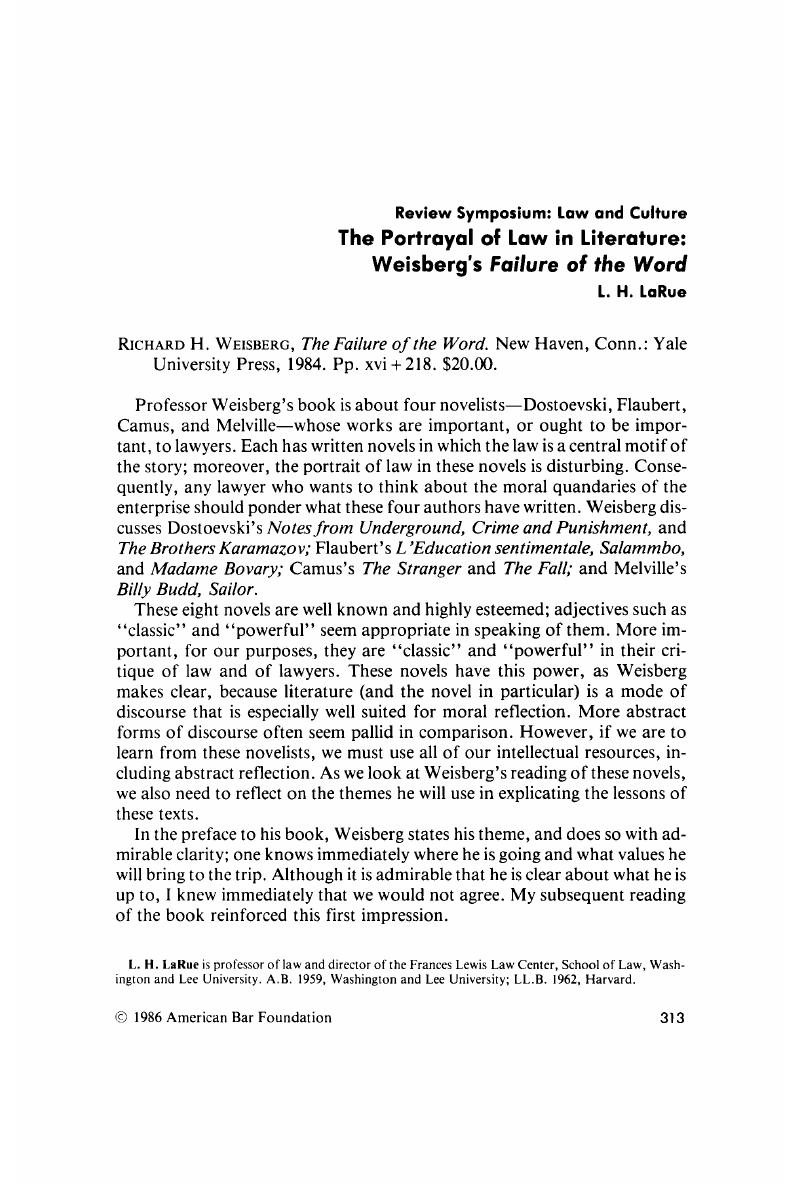No CrossRef data available.
Published online by Cambridge University Press: 20 November 2018

1 Bolt, Robert, A Man for All Seasons 73 (New York: Vintage Books, 1962).Google Scholar
2 Fingarette, Herbert, Self-Deception (London: Routledge & Kegan Paul, 1969).Google Scholar
3 Id. at 125.Google Scholar
4 Id. at 131, 133.Google Scholar
5 Williams, Raymond, The Country and the City (New York: Oxford University Press, 1973).Google Scholar
6 Id. at 10.Google Scholar
7 Id. Google Scholar
8 I sent the typescript of this review to Weisberg, and he dissented from the above. He wrote: “I found it most disturbing that you find in my book what I negate throughout—namely the opposition of wordiness and spontaneity [Throughout the book] I suggest that in a period in which there are positive values culturally, words and spontaneity … can clearly coexist.” Weisberg is right in saying that this counter-message is also present in his book; furthermore, 1 like the parts of the book in which this countermessage is presented. However, there is a difficult problem here: How do the different parts of the book fit together? I have no easy answer to this question, and I would prefer to let the readers of Weisberg, and I hope there are many, judge for themselves.Google Scholar
9 Before 1 go further, I wish to record a central point of agreement with Weisberg. In conversation, Professor Weisberg said: “We both agree that Vere is not the hero, and then we go in different directions. The agreement is more important than the disagreement; we are in the same church.” This comment is true, and the reason it is true is connected with the history of commentary on the novella, especially the commentary written by lawyers. Historically, Vere has been cast as a tragic hero. I agree with Weisberg that this sort of typecasting is wrong and simplistic. I also agree with him that this particular error, in the history of commentary, has been pernicious. Lawyers have used this interpretation to disclaim responsibility for what they do.Google Scholar
10 “Ay, sir,” emotionally broke in the officer of marine, “But surely Budd purposed neither mutiny nor homicide.”“Surely not, my good man. At the Last Assizes it shall acquit. But how here? We proceed under the law of the Mutiny Act. In feature no child can resemble his father more than that Act resembles in spirit the thing from which it derives—War. War looks but to the frontage, the appearance. And the Mutiny Act, War's child, takes after the father. Budd's intent or non-intent is nothing to the purpose.” Herman Melville, Billy Budd, Sailor 111–12, ed. Hayford & Sealts (Chicago: University of Chicago Press, 1962).Google Scholar
11 “Can we not convict and yet mitigate the penalty?” asked the sailing master, here speaking, and falteringly, for this first.Google Scholar
“Gentlemen, were that clearly lawful for us under the circumstances, consider the consequences of such clemency. The people [meaning the ship's company] have native sense .how would they take it? Your clement sentence they would account pusillanimous. They would think that we flinch, that we are afraid of them.”Id. at 112–13.Google Scholar